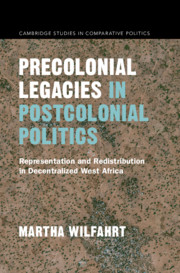 Precolonial Legacies in Postcolonial Politics
Precolonial Legacies in Postcolonial Politics Book contents
- Precolonial Legacies in Postcolonial Politics
- Cambridge Studies in Comparative Politics
- Precolonial Legacies in Postcolonial Politics
- Copyright page
- Contents
- Figures
- Tables
- Acknowledgments
- Introduction
- 1 A Theory of Institutional Congruence
- 2 Bringing Old States Back In
- 3 The Politics of Decentralization in Senegal
- 4 Political Narratives across Rural Senegal
- 5 Delivering Schools and Clinics in Rural Senegal
- 6 Congruence and Incongruence in Action
- 7 Decompressing Legacies of Public Goods Delivery, 1880–2012
- 8 Institutional Congruence beyond Senegal
- Conclusion
- Appendix
- Bibliography
- Index
- Cambridge Studies in Comparative Politics
1 - A Theory of Institutional Congruence
- Precolonial Legacies in Postcolonial Politics
- Cambridge Studies in Comparative Politics
- Precolonial Legacies in Postcolonial Politics
- Copyright page
- Contents
- Figures
- Tables
- Acknowledgments
- Introduction
- 1 A Theory of Institutional Congruence
- 2 Bringing Old States Back In
- 3 The Politics of Decentralization in Senegal
- 4 Political Narratives across Rural Senegal
- 5 Delivering Schools and Clinics in Rural Senegal
- 6 Congruence and Incongruence in Action
- 7 Decompressing Legacies of Public Goods Delivery, 1880–2012
- 8 Institutional Congruence beyond Senegal
- Conclusion
- Appendix
- Bibliography
- Index
- Cambridge Studies in Comparative Politics
Summary
Chapter 1 articulates the theory of institutional congruence. I argue that persistent forms of social cooperation at the grassroots are revitalized following institutional reform because some communities have inherited robust social institutions that stipulate appropriate social behavior. I elaborate on the theory’s dual mechanisms of shared social identification and dense cross-village network ties to illustrate how institutional congruence helps local elites navigate the two-level political game introduced by decentralization: local elected officials face pressure within their villages on a first level that are not always compatible with their incentives at the second level of the local state itself, where they must negotiate with other elites from other villages. When shared social institutions stretch across the many villages of a local government, elites find it easier to negotiate at the second level of the local state because these social institutions reorient them toward group-based goals. As a consequence, local representation and redistribution is expected to be broader across space under conditions of high congruence, but contentious and targeted when it is low.
Keywords
- Type
- Chapter
- Information
- Precolonial Legacies in Postcolonial PoliticsRepresentation and Redistribution in Decentralized West Africa, pp. 22 - 46Publisher: Cambridge University PressPrint publication year: 2021


